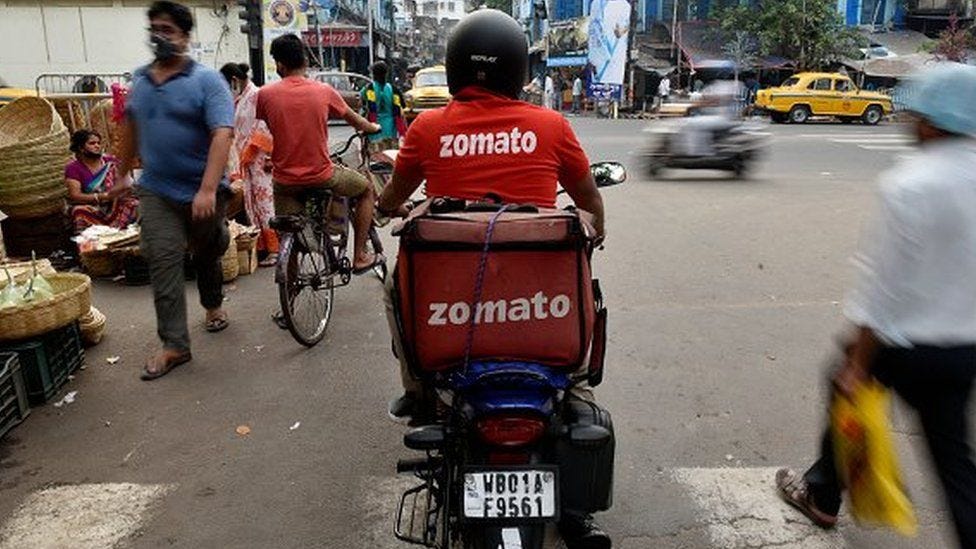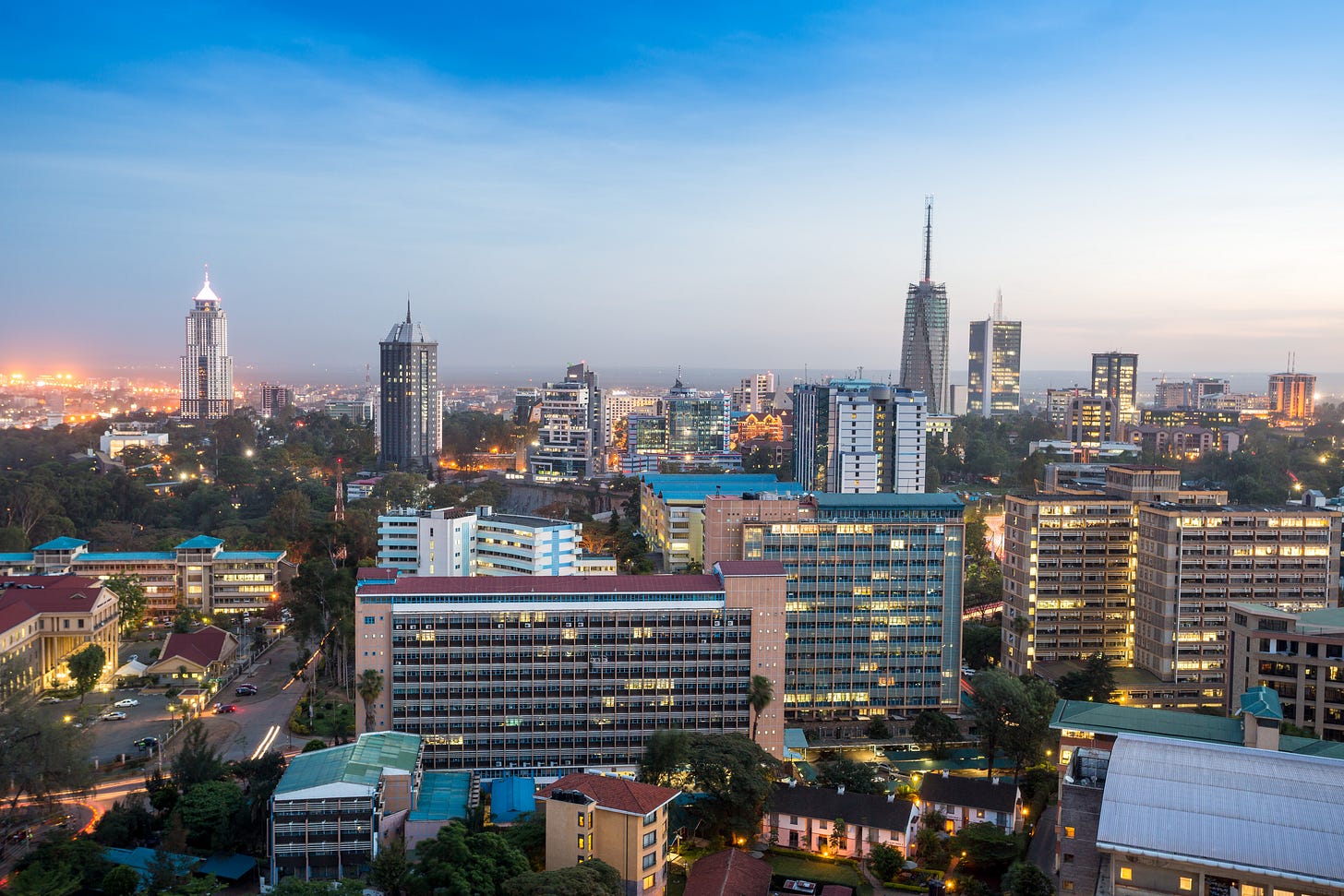Emerging Markets Daily - July 14
Global Holdings of China Stocks Surge, South Africa Riots Aftermath, Zomato Leads Hot India IPO Market, Uruguay and Mercosur Tensions, Kenya and Ghana Lead Fintech
The Top 5 Emerging Markets Stories from Global Media - July 14
Global Holdings of Chinese Stocks, Bonds Surge To More than $800B
Financial Times
“Global holdings of Chinese stocks and bonds have surged about 40 per cent to more than $800bn over the past year as investors bought assets at a record pace in spite of souring relations between Beijing and the international community.”
“The drive into China’s markets by global investors has come despite tensions between Beijing and Washington over issues from corporate audits to Beijing’s repression of Uyghurs in Xinjiang, which the US has labelled genocide. It has also coincided with a crackdown by Beijing on Chinese listings in US capital markets, including a probe into data security at ride-hailing group Didi Chuxing announced just days after its $4.4bn New York listing.”
“Offshore investors have bought a net $35.3bn of Chinese stocks in the year to date via trading platforms that link Hong Kong with exchanges in Shanghai and Shenzhen, according to Financial Times calculations based on Bloomberg data.”
“That was about 49 per cent higher compared with a year earlier. Foreign investors have also bought more than $75bn in Chinese Treasuries in the year to date, according to figures from Crédit Agricole, representing a 50 per cent rise from a year earlier.”
“Foreign buying of Chinese stocks and government bonds has risen at the fastest rate ever compared with corresponding periods in previous years. Enthusiasm for Chinese assets has been fuelled by the country’s swift rebound from the Covid-19 pandemic but concerns are surfacing that its economic growth is slowing.” Hudson Lockett reports.
Shortages, Long Queues and Clean-Up After South Africa Riots
BBC
“Long queues have formed outside shops and petrol stations in South Africa's port city of Durban following days of unrest sparked by the jailing of former President Jacob Zuma.”
“Firefighters are cleaning up the mess, helped by local residents wielding brooms. Rioters looted and destroyed shops, leading to severe shortages of basics.Some petrol stations have limited the amount motorists can buy, as fuel transportation has been disrupted. Local media are also reporting queues in Johannesburg.”
“Meanwhile, Northern Cape and Mpumalanga have become the latest provinces to be hit by violence. The BBC's Nomsa Maseko in Durban says the city's business owners are slowly returning to their shops to evaluate the damage following days of unrest.Empty shoe boxes, broken dishes, rotting food and debris litter virtually every street in this normally bustling city centre, she says.”
“Zuma, 79, was convicted of contempt of court last month after failing to attend an inquiry into corruption during his presidency. He handed himself in to police last Wednesday to start serving his 15-month prison sentence, but this sparked violent protests, arson attacks, and opportunistic looting in his home province of KwaZulu-Natal.” BBC reports.
Ant-Backed Zomato, Paytm Set to Supercharge Hot India IPO Market
Bloomberg
“After clocking its busiest first half since at least 2009, India’s IPO market is gearing up for an even bigger boom as a cluster of homegrown startups including Ant Group Co.-backed Zomato Ltd. prepare to go public.”
“Zomato, an online food delivery platform, started taking public orders Wednesday for its hotly-anticipated $1.3 billion initial public offering. Its IPO is set to be India’s biggest since March 2020, according to data compiled by Bloomberg.” Nupur Acharya and Baiju Kalesh report
Cracks Emerge in Mercosur Trade Bloc as Uruguay Looks to go it Alone
Buenos Aires Times
“Deep cracks have emerged in the Mercosur trade bloc, as leaders of its four member countries argued at a summit Thursday over relaxing common rules on tariffs and trade.”
“The 30-year-old bloc, one of the world's top five economies prior to the coronavirus pandemic, introduced a rule in 2000 that made it compulsory to jointly negotiate common trade deals with third parties. The bloc also imposes common tariffs on imports from abroad.”
“But now, Uruguay has said it wants to negotiate its own trade deals, while Brazil wants to lower tariffs on imports from abroad to boost competitiveness, threatening Argentina's exports in particular.”
“Argentina's Peronist leader Alberto Fernandez on Thursday urged respect for Mercosur's so-called ‘consensus’ principle – a construct Brazil and Uruguay said they considered ‘archaic’ and economically paralysing.” Buenos Aires Times reports
Kenya and Ghana Lead Fintech Charge Across Africa
African Business
“Although the ‘Africa Rising’ narrative has received immense criticism from within and outside the continent, efforts being applied by Kenya and Ghana represent a huge leap forward in joining the rest of the world and capitalising on the potential of the digital economy.”
“…A 2020 report by American research firm Boston Consulting Group (BCG) reveals that Kenya and Ghana have the second and third highest mobile payment usage in the world respectively, after China.”
“…In Kenya, according to the study, transactions via mobile wallets and phones represent 87% of the country’s Gross Domestic Product (GDP), while in Ghana, they account for 82% of GDP.”
“…But both countries have had to leapfrog huge hurdles over the years to emerge as the best in the fintech sphere in Africa, bypassing a number of regulatory and network bottlenecks that threatened to kill innovations in their infancy.” Faustine Ngila reports
Happy Bastille Day to Our Franco-phone Readers!
Oh, and if you are in France, get vaccinated, Macron says, or don’t go to cafes or just about anywhere else…
The Hill
“More than 1 million people in France have made appointments to get the coronavirus vaccine after French President Emmanuel Macron said COVID-19 passes would soon be needed for daily activities.” The Hill reports
What We’re Also Reading…
Goldman May Need Some New EM Sales Talent
Efinancialcareers.com
“Goldman's macro emerging markets sales team has had a few departures this year. As we reported first in May, Aziz McMahon, the London-based head of emerging sales, left after making what seemed to be a lot of money on Dogecoin and is theoretically setting up a new hedge fund, which has yet to surface.”
“Now, other members of McMahon's team seem to be leaving too. Mark Vaillant, an executive director on McMahon's former team has gone to Morgan Stanley according to his LinkedIn profile. After nearly seven years at GS, Vaillant is joining MS as an emerging markets FX and rates salesperson for real money and hedge fund clients - a role similar to the one he was doing at Goldman.”
“The two exits suggest Goldman might need some more emerging markets macro sales talent in London. The firm is due to report its second quarter results later today; macro desks across the market have had a comparatively weak start to the year, which means salespeople and traders in the market may be inspired to switch jobs in an attempt to lock in pay at the comparatively high levels of last year.” Efinancialcareers.com reports
Can the Olympics Succeed Behind Closed Doors?
Financial Times
“Intended to mark Japan’s economic revival but hit by the pandemic, the games has instead become a matter of survival.”
“…Yet looming over all the on-field action will be one big question: what are these Olympics for? They will be held in a city still paralysed by a Covid-19 state of emergency after 18 months of economic crisis. No foreign fans will be in Japan and no Japanese fans will be allowed in the stadiums; the athletes will be kept in a bubble, without any chance to meet the public.”
“…Rather than Japanese national revival or humanity’s contest with a virus, the best chance for the Tokyo Olympics may be if they are nothing more than a sports event. After everything else was cut, all that remains of Tokyo 2020 is the athletes and the simple questions. Who is the fastest? Who can go highest? Who is the strongest?” Robin Harding, Kana Inagaki, Murad Ahmed, and Sara Germano report
A Generation of Young Afghans Faces End of the US Era
Nikkei Asia
“America is ending the longest conflict in its history by pulling out of Afghanistan, after 20 years of fighting. But the country it is departing has already been at war for more than twice as long. And the situation America leaves behind -- with the Pakistan-backed Taliban resurgent and the US-backed government on its heels - could yet mean another round of Afghanistan's ‘forever’ war.”
“…Taking the capital or other big cities might still be beyond the Pakistan-backed Taliban. But that conjures fears of a bloody stalemate and civil war. The biggest losers are likely to be people like Sharifi and Gul Rukh, Afghanistan's young people, who dared to hope that a better, more stable future was possible. At least two-thirds of today's population of around 35-40 million are under 25; more than half have been born since the 9/11 attacks that prompted the U.S. invasion and led to the ousting of the Taliban.”
“They have helped create the outlines of a country that is visibly, materially and philosophically different to the Afghanistan the U.S. invaded in 2001 -- and now far more connected to the outside world.” Andrew North reports







